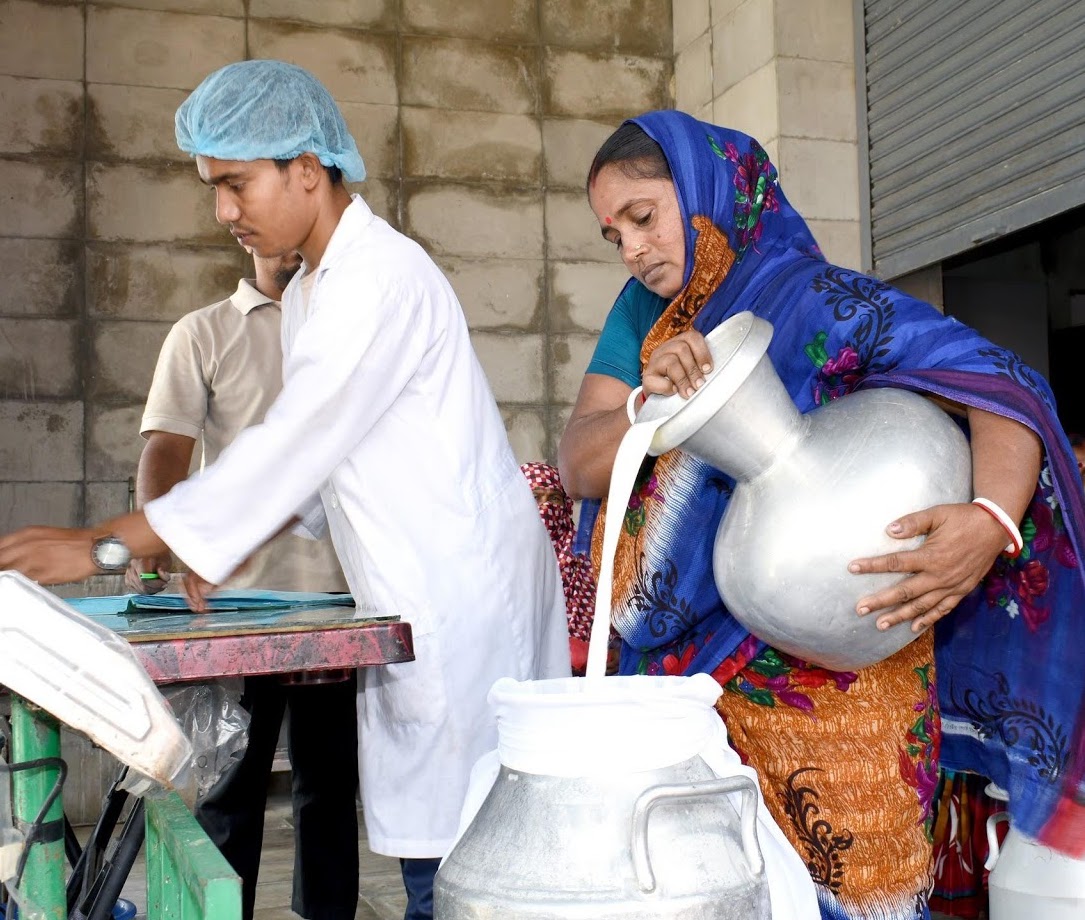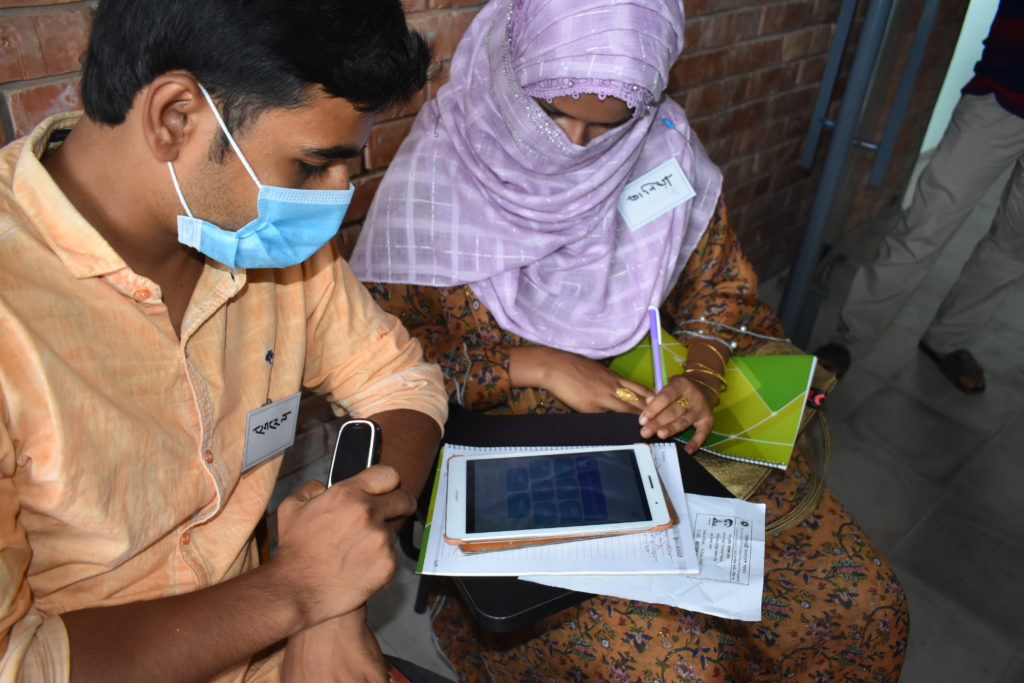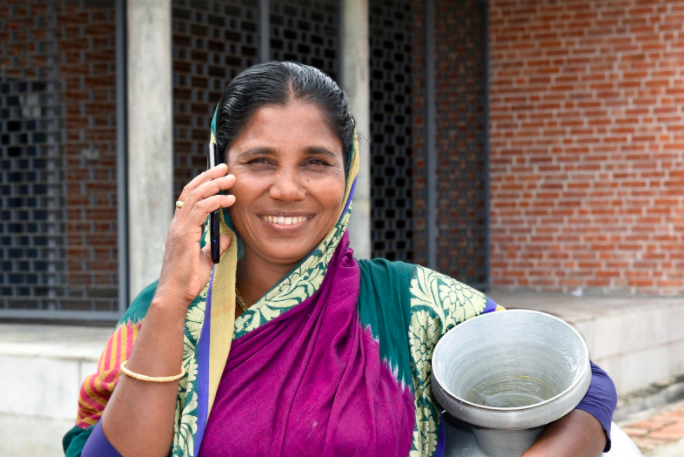Dairy farming is the predominant source of income generation for rural communities in Bangladesh. Smallholders produce nearly 90% of the milk sold locally, and 93% of the milk produced is sold in the informal milk market.
Most of Bangladesh’s milk production is carried out by women farmers. They face several challenges including low yields due to poor cattle management, lack of quality feed and fodder, limited access to veterinary services, and poor accessibility to markets. The sector is fragmented and mostly controlled by local milk collectors. This results in widespread exploitation of smallholder farmers.

Winner of the USAID-funded WomenConnect Challenge
In late 2019, Solidaridad was selected as one of the three winners of the second round of the USAID-funded WomenConnect challenge (WCC). This Challenge was launched as part of the Women’s Global Development and Prosperity Initiative, a U.S. Government effort that aims to reach 50 million women in developing countries by 2025. Specifically, the WomenConnect Challenge seeks to bridge the gender digital divide so that women can fully participate in the global economy. The award has led to a new partnership with USAID and DAI Global LLC., the manager of the challenge fund. It has also marked another step for Solidaridad’s Digital Solutions and Gender Inclusivity programmes.
In Bangladesh, Solidaridad has been actively working with women dairy farmers since 2012 as part of the SaFal (Sustainable Agriculture, Food Security and Linkages) program. The initiative has focused on improved livestock management, input supply, breed development, and market linkages. By training entrepreneurs in the community, SaFaL also promoted the establishment of 15 Milk Collection Centers (MCCs) where women dairy farmers can sell the milk and get paid fair prices, based on the quality and quantity of milk delivered.
Despite an improvement in women’s participation in farm management, marketing, and entrepreneurship, Solidaridad identified two important challenges faced by women dairy farmers:
- Currently, while women farmers are engaged in all of the activities related to milk production, they often do not receive the money obtained from the sale of milk. This is because the milk is usually taken by a male family member to the collection center, who receives the money. Limited mobility, as well as existing gender dynamics and power relations restrict women’s abilities to exercise equal access to and control over financial resources. Lack of ownership of income also leads to poor investments in raising the productivity of their farm businesses.
- While SaFaL has been promoting several good dairy farming practices among women dairy farmers, our evaluations show that there is huge scope for improvement in knowledge levels and adoption of these practices.
As part of the WCC grant, Solidaridad’s project on “Digital Inclusion and Empowerment for Women Dairy Farmers in Bangladesh” will focus on the following:
- Ensuring economic empowerment of women through digital financial inclusion
- Provision of Digital Dairy Advisory Services
Development of Digital Solutions Underway
While the project kicked off in March this year, the pace of implementation was slowed down due to the unexpected COVID-19 crisis. However, the project teams have been adapting to the constraints and progressing on project activities.
Solidaridad is currently working on developing two digital solutions:
- Inclusion Through Integration (i2i) App: Solidaridad will develop a digital application called the i2i app that will collect data from the milk collection centers (quality and quantity of milk delivered, and the sale price of milk thereof) and link up to mobile wallets of women farmers, such that women are directly able to get the money owed to them. Solidaridad will partner with bKash to provide the mobile wallets for the women farmers. BRAC Dairy is the off-taker for the milk from the milk collection centers operated by Solidaridad-trained entrepreneurs.
- Interactive Voice Response (IVR) System for improved knowledge on good dairy farming practices: An IVR system will send text and voice messages to women dairy farmers, providing information and training related to improved dairy farming practices. This will not only reinforce knowledge gathered during in-person training, but also allow for the information to be provided in a timely manner, based on the milk production cycle.

Adaptation to COVID-19 and Next Steps
To surmount the constraints posed by COVID-19, Solidaridad’s team has been using digital tools such as video conferencing and WhatsApp to engage remotely with farmers, community support cadres, milk collection center operators, and other stakeholders, to lay the groundwork for this initiative. Additional orientation sessions are also being organized. A human-centered design research exercise will soon be carried out to ensure that the digital tools developed are addressing the needs, priorities, and constraints of women-dairy farmers. Deployment of the tools will also be complemented by comprehensive household-level training to ensure that family members appreciate the value of financial inclusion for women farmers and their improved capacities in dairy farming.
Over the next two years, Solidaridad will reach 12,000 women farmers in Bangladesh’s Khulna and Jessore districts through these digital tools. The data gathered from the tools will enable the teams to improve the effectiveness of their programming related to dairy farming and other commodities. The lessons learned from the design and deployment of these tools will also provide valuable lessons for Solidaridad’s global Digital Solutions program.

